31st March 2009 - New research
THE PREVALENCE OF
DROOLING IN PARKINSON'S DISEASE
Journal of Neurology [2009] (Kalf JG, de Swart BJ, Borm GF, Bloem BR, Munneke
M.)
Complete abstract
Drooling (sialorrhea) is when saliva flows outside the mouth. It is usually
caused by excess production of saliva by the salivary glands, or problems with
swallowing. For more information go to
Drooling.
Drooling is a frequently reported symptom in people with Parkinson's Disease.
However, exactly how common drooling is in Parkinson's
Disease
is not known.
 Although it is often suggested that it is part of Parkinson's
Disease, in many people it occurs no more than it does in anyone else. The aim of
this study was to systematically review the prevalence of drooling in
Parkinson's Disease. It was found that drooling occurred in just over half (56%)
of people with Parkinson's Disease. In those people that did not have
Parkinson's Disease it occurred in only 1 in 7 people (14%). So drooling
was four times more likely in Parkinson's Disease, but still did not occur in
nearly half of patients. In a quarter (22%-26%) of people with Parkinson's
Disease, drooling appears to be a frequently occurring problem. It becomes more
likely as Parkinson's Disease gets worse.
Although it is often suggested that it is part of Parkinson's
Disease, in many people it occurs no more than it does in anyone else. The aim of
this study was to systematically review the prevalence of drooling in
Parkinson's Disease. It was found that drooling occurred in just over half (56%)
of people with Parkinson's Disease. In those people that did not have
Parkinson's Disease it occurred in only 1 in 7 people (14%). So drooling
was four times more likely in Parkinson's Disease, but still did not occur in
nearly half of patients. In a quarter (22%-26%) of people with Parkinson's
Disease, drooling appears to be a frequently occurring problem. It becomes more
likely as Parkinson's Disease gets worse.
27th March 2009 - News release
EMERGENCY WORKERS WITH PARKINSON'S DISEASE
There are a variety of toxins known to be able to cause symptoms of Parkinson's
Disease. For more information go to
Toxic causes of Parkinson's Disease. Emergency workers can be dangerously
subjected to some of these toxins. In the U.S.A., in the state of Indiana, a
Senate Bill has been overwhelmingly approved that would require Parkinson's
Disease to be treated as a line-of-duty disability under an emergency
responder's pension and disability plan, entitling them to greater benefits. The
overwhelming approval makes it likely that such legislation will become
far more widespread. The bill was spearheaded by fire
fighter Gary Coons who was diagnosed with Parkinson's Disease whilst only 33.
Gary Coons had been campaigning continuously. For more,
see
Firefighters with Parkinsons.
 The
chances
of anyone having Parkinson's Disease at that age are less than 1 in 100,000,
making it a rare medical disorder, and
therefore more likely to be the result of unusual circumstances. Gary
Coons was the lead investigator of a large paint warehouse fire that caused him
to be seriously exposed to known toxic causes of Parkinson's Disease without
being given sufficient protective equipment. Toxicity is a probable cause when
the Parkinson�s symptoms develop rapidly after a probable chemical exposure. For more information go to the complete
News release. Viartis
provided a comprehensive review of toxic causes of
Parkinson's Disease in order to assist his application.
The
chances
of anyone having Parkinson's Disease at that age are less than 1 in 100,000,
making it a rare medical disorder, and
therefore more likely to be the result of unusual circumstances. Gary
Coons was the lead investigator of a large paint warehouse fire that caused him
to be seriously exposed to known toxic causes of Parkinson's Disease without
being given sufficient protective equipment. Toxicity is a probable cause when
the Parkinson�s symptoms develop rapidly after a probable chemical exposure. For more information go to the complete
News release. Viartis
provided a comprehensive review of toxic causes of
Parkinson's Disease in order to assist his application.
24th March 2009 - New research
THE DISCOVERY OF HOW
DEEP BRAIN STIMULATION AFFECTS PARKINSON'S DISEASE
Science [2009] Mar 19. [Epub ahead of print] (Gradinaru
V, Mogri M, Thompson KR, Henderson JM, Deisseroth K.) Complete abstract
Deep brain stimulation (DBS)
is a method of treating Parkinson's Disease that
involves the use of electrodes that are implanted into the brain and connected
to a small electrical device that can be externally programmed. DBS is able to
reduce the need for Parkinson's Disease drugs.
For more information go to
Deep
brain stimulation. It has always been uncertain as to how DBS has such
a strong effect on Parkinson's Disease. Researchers used light to illuminate how
the treatment works. They had suspected that brain cells are stimulated or
calmed, leading to reduced Parkinson's
Disease symptoms. Yet when they tried every type of brain cell they found that
DBS had no direct effect on them.
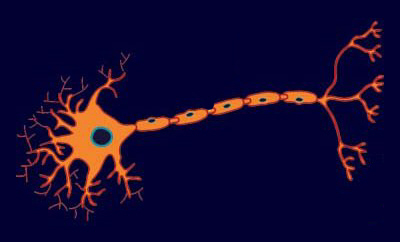 It was instead found that the effect occurs,
not by stimulating cells, but by stimulating axons. Axons are what connect
nerve cells to other nerve cells, as can be seen in the diagram. Axons can be
more than a metre (several feet) in length. For more information go to
Axons.
For more information go to the complete
News report. The effect of artificially
stimulating brain cells can wear off in time, but so can artificially
stimulating axons as it is now known occurs with DBS.
It was instead found that the effect occurs,
not by stimulating cells, but by stimulating axons. Axons are what connect
nerve cells to other nerve cells, as can be seen in the diagram. Axons can be
more than a metre (several feet) in length. For more information go to
Axons.
For more information go to the complete
News report. The effect of artificially
stimulating brain cells can wear off in time, but so can artificially
stimulating axons as it is now known occurs with DBS.
20th March 2009 - New
research
SPINAL CORD
STIMULATION FOR PARKINSON'S DISEASE
Science [2009] 323 (5921) : 1578 - 1582
(Romulo Fuentes, Per Petersson, William B.Siesser, Marc G.Caron, Miguel
A.L.Nicolelis)
Complete abstract
Researchers have found that electrical stimulation
of the spinal cord restores movement in mice who have been depleted of dopamine
pharmacologically, and in chronic 6-hydroxydopamine�lesioned rats. Both of these conditions simulate Parkinson's Disease.
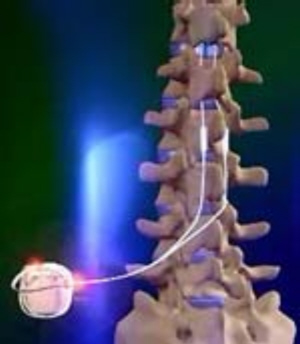 The functional
recovery was paralleled by a disruption of aberrant low-frequency corticostriatal oscillations, leading to the
emergence of neuronal activity patterns that resemble the state normally preceding spontaneous initiation of movement. The
researchers are therefore suggesting that the method may become an effective
means of treating Parkinson's Disease. The method appears to use similar
principles and methods as those used with Deep Brain Stimulation (DBS). As with
Deep Brain Stimulation it would have to be used continuously. The researchers
anticipate that the device will be similar to those already used to treat
chronic pain. They use small leads that are implanted over the spinal cord and
connected to a portable generator. For more information go to the complete
News report.
The functional
recovery was paralleled by a disruption of aberrant low-frequency corticostriatal oscillations, leading to the
emergence of neuronal activity patterns that resemble the state normally preceding spontaneous initiation of movement. The
researchers are therefore suggesting that the method may become an effective
means of treating Parkinson's Disease. The method appears to use similar
principles and methods as those used with Deep Brain Stimulation (DBS). As with
Deep Brain Stimulation it would have to be used continuously. The researchers
anticipate that the device will be similar to those already used to treat
chronic pain. They use small leads that are implanted over the spinal cord and
connected to a portable generator. For more information go to the complete
News report.
18th March 2009 - New research
RESIDENTIAL PESTICIDES
INCREASE PARKINSON'S DISEASE
American Journal of Epidemiology [2009] Mar 6 [Epub ahead of print] (Costello S,
Cockburn M, Bronstein J, Zhang X, Ritz B.)
Complete abstract
It is usually assumed that certain pesticides can
increase the risk of Parkinson's Disease in agricultural workers. However, it
has been shown that even people tending to their own gardens can be affected.
 Researchers have also
found
that merely exposure in the vicinity of the home can greatly increase the
likelihood of developing Parkinson's Disease. Exposure to the pesticides maneb and
paraquat within 500m of the home increased the risk of Parkinson's Disease by
75%. People who were younger than 60 years old at the time of diagnosis were at
a much higher risk. In those people, the risk more than doubled (2.27 times)
when exposed to either maneb or paraquat alone, and more than quadrupled (4.17
times) when exposed to both of these pesticides in combination.
Researchers have also
found
that merely exposure in the vicinity of the home can greatly increase the
likelihood of developing Parkinson's Disease. Exposure to the pesticides maneb and
paraquat within 500m of the home increased the risk of Parkinson's Disease by
75%. People who were younger than 60 years old at the time of diagnosis were at
a much higher risk. In those people, the risk more than doubled (2.27 times)
when exposed to either maneb or paraquat alone, and more than quadrupled (4.17
times) when exposed to both of these pesticides in combination.
16th March 2009 - New research
2000 YEAR OLD CASE OF PARKINSON'S DISEASE
Neurogenetics [2009] Mar 13. [Epub ahead of print] (Bar-Shira A, Hutter CM,
Giladi N, Zabetian CP, Orr-Urtreger A.)
Complete abstract
It
is often claimed that Parkinson's Disease was discovered in 1817 by James
Parkinson. However, there have been descriptions and treatments of Parkinson's
Disease since ancient times. For more information go to the
History of Parkinson's Disease.
 There is a genetic
mutation called LRRK2 G2019S that increases the likelihood of Parkinson's
Disease. It is most common amongst Ashkenazi Jews. Ashkenazi Jews descend from
Jews in medieval Germany. It was found that Ashkenazi Jews who had Parkinson's
Disease due to this genetic mutation had a common ancestor who lived nearly 2000
years ago. Their ancestor, who would have probably had Parkinson's Disease,
lived approximately 1,830 (1,560-2,160) years ago, around the second century
A.D., after the second Jewish Diaspora. At that time, Israel was still under
Roman rule.
Genetic disorders are usually acquired by one person at some point, and are then
inherited by their descendents for ever more. So some people have Parkinson's
Disease because of somebody who lived over a thousand years ago.
For more information go to
Genetic causes of Parkinson's Disease.
There is a genetic
mutation called LRRK2 G2019S that increases the likelihood of Parkinson's
Disease. It is most common amongst Ashkenazi Jews. Ashkenazi Jews descend from
Jews in medieval Germany. It was found that Ashkenazi Jews who had Parkinson's
Disease due to this genetic mutation had a common ancestor who lived nearly 2000
years ago. Their ancestor, who would have probably had Parkinson's Disease,
lived approximately 1,830 (1,560-2,160) years ago, around the second century
A.D., after the second Jewish Diaspora. At that time, Israel was still under
Roman rule.
Genetic disorders are usually acquired by one person at some point, and are then
inherited by their descendents for ever more. So some people have Parkinson's
Disease because of somebody who lived over a thousand years ago.
For more information go to
Genetic causes of Parkinson's Disease.
14th March 2009 - New research
CHOCOLATE CONSUMPTION INCREASED IN PARKINSON'S DISEASE
Journal of Neurology [2009] Mar 13. [Epub ahead of print] (Wolz M, Kaminsky A,
L�hle M, Koch R, Storch A, Reichmann H.)
Complete abstract
There is an increased consumption of chocolate in people
with Parkinson's Disease. Consumption of non-chocolate sweets was no different
from the consumption of other people. The increase in chocolate consumption was
not related to the level of depression. Chocolate contains high contents of
biogenic amines. Biogenic amines include substances that the brain produces in order
to regulate or stimulate brain function. For more information
go to
Biogenic amines.
 Chocolate also contains caffeine and theobromine, both of which
are adenosine antagonists. Adenosine antagonists make L-dopa and dopamine more
active. For more information go to
Adenosine antagonists. So it seems that some people with Parkinson's Disease
are unconsciously using chocolate to increase their dopamine activity. Due to
its chemistry, and people claiming it has reduced their symptoms, researchers
have recently suggested that the effect of
chocolate be assessed therapeutically in Parkinson's Disease. Istradefylline,
another adenosine antagonist, has already been shown to have effect in
Parkinson's Disease. For more information go to the
Complete abstract.
Chocolate also contains caffeine and theobromine, both of which
are adenosine antagonists. Adenosine antagonists make L-dopa and dopamine more
active. For more information go to
Adenosine antagonists. So it seems that some people with Parkinson's Disease
are unconsciously using chocolate to increase their dopamine activity. Due to
its chemistry, and people claiming it has reduced their symptoms, researchers
have recently suggested that the effect of
chocolate be assessed therapeutically in Parkinson's Disease. Istradefylline,
another adenosine antagonist, has already been shown to have effect in
Parkinson's Disease. For more information go to the
Complete abstract.
12th March 2009 - New clinical study
HUGE GENETIC STUDY OF
PARKINSON'S DISEASE
The Google co-founder is to spend millions of
dollars on a genetic study of Parkinson�s Disease after learning that he has a
mutation that confers a high risk of Parkinson's Disease. The
programme will invite 10,000 Parkinson�s
Disease patients to have their DNA analysed in order to investigate inherited
and environmental factors that contribute to
the disease and to advance research into new treatments. Unusually, patients
will have to pay to participate in the study. However, 23andMe will be charging
only $25 rather than the $399 it normally charges to
carry
out the DNA scans.
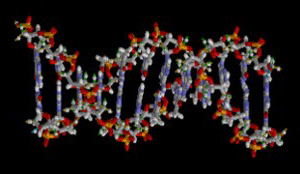 The Google co-founder
is
married to the 23andMe co-founder. For more information go to the
News report. People can
participate in the study via the
Michael J.Fox Foundation. The present
knowledge of genetics in Parkinson's Disease is that most people do not inherit
Parkinson's Disease. However, there are a small minority of people who have genetic mutations that incline them towards
Parkinson's Disease.
For more information go to
Genetic causes of Parkinson's Disease.
The Google co-founder
is
married to the 23andMe co-founder. For more information go to the
News report. People can
participate in the study via the
Michael J.Fox Foundation. The present
knowledge of genetics in Parkinson's Disease is that most people do not inherit
Parkinson's Disease. However, there are a small minority of people who have genetic mutations that incline them towards
Parkinson's Disease.
For more information go to
Genetic causes of Parkinson's Disease.
10th March 2009 - New research
PRAMIPEXOLE v L-DOPA
Archives of
Neurology [2009] 66 (5) (Parkinson Study Group CALM Cohort Investigators)
Complete abstract
Pramipexole (Mirapex) is a
dopamine agonist.
Dopamine agonists are drugs that mimic dopamine by stimulating the
dopamine receptors. For more information go to
Pramipexole.
The purpose of this study was to compare the long term effect of starting with Pramipexole
(Mirapex) against starting with the use of L-dopa. On the Activities of Daily Living Scale, the scores were similar. Motor
complications (wearing off, on-off effects, or dyskinesias) were more common in people using L-dopa. Disabling
dyskinesias were uncommon in both groups. Sleepiness was
significantly
worse in the Pramipexole group.
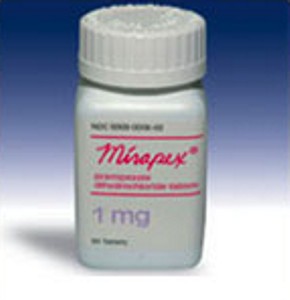 People starting off with Pramipexole were more
likely to experience edema (swelling from excess fluid). On the standard
Parkinson's Disease symptom score (the UPDRS) there was little difference
between the two groups. After six years, most patients were taking a combination
of drugs, with over 90% taking L-dopa. Of those who started on Pramipexole, 84%
still continued with the use of Pramipexole. This study appears to have only
assessed measures largely favourable to Pramipexole. It did not report the
unusual adverse effects of Pramipexole that can include compulsive gambling,
hypersexuality, and overeating, and also the other varied side effects. For more
information go to
Pramipexole.
People starting off with Pramipexole were more
likely to experience edema (swelling from excess fluid). On the standard
Parkinson's Disease symptom score (the UPDRS) there was little difference
between the two groups. After six years, most patients were taking a combination
of drugs, with over 90% taking L-dopa. Of those who started on Pramipexole, 84%
still continued with the use of Pramipexole. This study appears to have only
assessed measures largely favourable to Pramipexole. It did not report the
unusual adverse effects of Pramipexole that can include compulsive gambling,
hypersexuality, and overeating, and also the other varied side effects. For more
information go to
Pramipexole.
9th March 2009 - New review
DOES PARKINSON'S DISEASE
OCCUR IN ANIMALS ?
Studies claiming a
"breakthrough" in Parkinson's Disease have described methods as being successful
despite only ever having been carried out on rats and mice - a fact that is
often barely mentioned in press releases. Some
"breakthroughs"
in Parkinson's Disease have actually involved fruit flies or worms
news
report.
 Although rats and
mice that are studied did not have Parkinson's Disease, they have been claimed
by researchers to be cured or largely rid of Parkinson's Disease. Their "Parkinson's Disease"
has instead been chemically induced. The weight of a human is about 100 times
that of a mouse or rat, so the dosages are not comparable. Side effects that
would be apparent in humans are often
unnoticeable in mice and rats. Given that
most drugs eventually cause an opposite
after effect, the results of what are usually short term studies are often
meaningless. Consequently, what is described as a "breakthrough" using rats or mice,
inevitably turns out to be useless when eventually tested in people that
actually do have Parkinson's Disease.
Although rats and
mice that are studied did not have Parkinson's Disease, they have been claimed
by researchers to be cured or largely rid of Parkinson's Disease. Their "Parkinson's Disease"
has instead been chemically induced. The weight of a human is about 100 times
that of a mouse or rat, so the dosages are not comparable. Side effects that
would be apparent in humans are often
unnoticeable in mice and rats. Given that
most drugs eventually cause an opposite
after effect, the results of what are usually short term studies are often
meaningless. Consequently, what is described as a "breakthrough" using rats or mice,
inevitably turns out to be useless when eventually tested in people that
actually do have Parkinson's Disease.
However, animals can still get Parkinson's Disease,
because the biochemistry of many animals is little different from that of
humans. It could occur in numerous animals such as dogs, cats, horses, rabbits,
monkeys. All mammals have to produce dopamine. So they are able to become
deficient in dopamine, just as humans are, and thereby develop Parkinson's
Disease. Some species don't live long enough for it to commonly occur. In some
animals it can appear different from how it does in humans, or is not so
apparent, or not so common.
4th March 2009 - New research
THE HIGH PREVALENCE OF
OSTEOPOROSIS IN PARKINSON'S DISEASE
Rheumatology
International [2008] 28 (12) : 1205-1209 (Bezza A, Ouzzif Z, Naji H, Achemlal L,
Mounach A, Nouijai M, Bourazza A, Mossadeq R, El Maghraoui A.)
Complete abstract
In Osteoporosis, the density of bone decreases and so makes people prone to
getting bone
fractures. For more information go to
Osteoporosis. One in six people (17%) with Parkinson's Disease were found to
have already developed Osteoporosis. Over half of all people (54%) with Parkinson's Disease have
been found to have osteopenia, which is low bone density,
as is shown on the right hand photograph. Osteopenia often
develops in to
Osteoporosis. For more information go to
Osteopenia.
 Due to the proneness
to falling that some people with Parkinson's Disease have, the risk of fractures
becomes even greater in those people that also have Osteoporosis. The
biochemistry of Parkinson's Disease and Osteoporosis do not coincide at all. Yet
Osteoporosis was found to be related to the severity of Parkinson's Disease. It
also becomes more likely with age. It is also related to low calcium intake, and
insufficient sun exposure. Sun exposure is a source of vitamin D, which is
essential for bone formation. It is possible to improve bone formation by
increasing calcium intake (such as from milk products), and by taking a
supplement that includes vitamin D.
Due to the proneness
to falling that some people with Parkinson's Disease have, the risk of fractures
becomes even greater in those people that also have Osteoporosis. The
biochemistry of Parkinson's Disease and Osteoporosis do not coincide at all. Yet
Osteoporosis was found to be related to the severity of Parkinson's Disease. It
also becomes more likely with age. It is also related to low calcium intake, and
insufficient sun exposure. Sun exposure is a source of vitamin D, which is
essential for bone formation. It is possible to improve bone formation by
increasing calcium intake (such as from milk products), and by taking a
supplement that includes vitamin D.
2nd March 2009 - New research
CLAIMED STEM CELL
BREAKTHROUGH
Nature [2009] advance online
publication 1 March 2009 ( Knut Woltjen, Iacovos P. Michael, Paria Mohseni1,
Ridham Desai1, Maria Mileikovsky, Riikka H�m�l�inen, Rebecca Cowling, Wei Wang,
Pentao Liu, Marina Gertsenstein, Keisuke Kaji, Hoon-Ki Sung, Andras Nagy)
Complete abstract
Sinai Hospital�s Dr.Nagy and his
team have discovered a new method of generating stem cells that does not require
embryos as starting points and that "could be used to generate cells from many
adult tissues such as a patient�s own skin cells." Their method does not require
viruses, and so "overcomes a hurdle for the future of safe, personalized stem cell therapies in humans".
They claim that "This research is a huge step forward on the path to new stem cell-based therapies" and that this
could lead to cures for illnesses such as Parkinson�s disease. For more
information
go to the
News release.
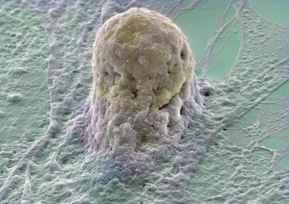 However, numerous stem cell operations in Parkinson's Disease have failed to rid
anyone of Parkinson's Disease. The failings would not be affected by this new
method. The latest of these caused the patient to end up worse than before the
stem cell operation. For more information go to
Stem cell surgery fails to rid Parkinson's Disease.
The use of stem cell surgery is based on the false
assumption that there is massive cell loss in Parkinson's Disease, yet not a
single study in the entire medical literature has ever shown that there is
massive cell loss in Parkinson's Disease. So although they
are overcoming a technical and ethical problem, they lack a sound scientific basis.
However, numerous stem cell operations in Parkinson's Disease have failed to rid
anyone of Parkinson's Disease. The failings would not be affected by this new
method. The latest of these caused the patient to end up worse than before the
stem cell operation. For more information go to
Stem cell surgery fails to rid Parkinson's Disease.
The use of stem cell surgery is based on the false
assumption that there is massive cell loss in Parkinson's Disease, yet not a
single study in the entire medical literature has ever shown that there is
massive cell loss in Parkinson's Disease. So although they
are overcoming a technical and ethical problem, they lack a sound scientific basis.
.gif)
.gif)
 Although it is often suggested that it is part of Parkinson's
Disease, in many people it occurs no more than it does in anyone else. The aim of
this study was to systematically review the prevalence of drooling in
Parkinson's Disease. It was found that drooling occurred in just over half (56%)
of people with Parkinson's Disease. In those people that did not have
Parkinson's Disease it occurred in only 1 in 7 people (14%). So drooling
was four times more likely in Parkinson's Disease, but still did not occur in
nearly half of patients. In a quarter (22%-26%) of people with Parkinson's
Disease, drooling appears to be a frequently occurring problem. It becomes more
likely as Parkinson's Disease gets worse.
Although it is often suggested that it is part of Parkinson's
Disease, in many people it occurs no more than it does in anyone else. The aim of
this study was to systematically review the prevalence of drooling in
Parkinson's Disease. It was found that drooling occurred in just over half (56%)
of people with Parkinson's Disease. In those people that did not have
Parkinson's Disease it occurred in only 1 in 7 people (14%). So drooling
was four times more likely in Parkinson's Disease, but still did not occur in
nearly half of patients. In a quarter (22%-26%) of people with Parkinson's
Disease, drooling appears to be a frequently occurring problem. It becomes more
likely as Parkinson's Disease gets worse.
 The
chances
of anyone having Parkinson's Disease at that age are less than 1 in 100,000,
making it a rare medical disorder, and
therefore more likely to be the result of unusual circumstances. Gary
Coons was the lead investigator of a large paint warehouse fire that caused him
to be seriously exposed to known toxic causes of Parkinson's Disease without
being given sufficient protective equipment. Toxicity is a probable cause when
the Parkinson�s symptoms develop rapidly after a probable chemical exposure. For more information go to the complete
The
chances
of anyone having Parkinson's Disease at that age are less than 1 in 100,000,
making it a rare medical disorder, and
therefore more likely to be the result of unusual circumstances. Gary
Coons was the lead investigator of a large paint warehouse fire that caused him
to be seriously exposed to known toxic causes of Parkinson's Disease without
being given sufficient protective equipment. Toxicity is a probable cause when
the Parkinson�s symptoms develop rapidly after a probable chemical exposure. For more information go to the complete
 It was instead found that the effect occurs,
not by stimulating cells, but by stimulating axons. Axons are what connect
nerve cells to other nerve cells, as can be seen in the diagram. Axons can be
more than a metre (several feet) in length. For more information go to
It was instead found that the effect occurs,
not by stimulating cells, but by stimulating axons. Axons are what connect
nerve cells to other nerve cells, as can be seen in the diagram. Axons can be
more than a metre (several feet) in length. For more information go to
 The functional
recovery was paralleled by a disruption of aberrant low-frequency corticostriatal oscillations, leading to the
emergence of neuronal activity patterns that resemble the state normally preceding spontaneous initiation of movement. The
researchers are therefore suggesting that the method may become an effective
means of treating Parkinson's Disease. The method appears to use similar
principles and methods as those used with Deep Brain Stimulation (DBS). As with
Deep Brain Stimulation it would have to be used continuously. The researchers
anticipate that the device will be similar to those already used to treat
chronic pain. They use small leads that are implanted over the spinal cord and
connected to a portable generator. For more information go to the complete
The functional
recovery was paralleled by a disruption of aberrant low-frequency corticostriatal oscillations, leading to the
emergence of neuronal activity patterns that resemble the state normally preceding spontaneous initiation of movement. The
researchers are therefore suggesting that the method may become an effective
means of treating Parkinson's Disease. The method appears to use similar
principles and methods as those used with Deep Brain Stimulation (DBS). As with
Deep Brain Stimulation it would have to be used continuously. The researchers
anticipate that the device will be similar to those already used to treat
chronic pain. They use small leads that are implanted over the spinal cord and
connected to a portable generator. For more information go to the complete
 Researchers have also
found
that merely exposure in the vicinity of the home can greatly increase the
likelihood of developing Parkinson's Disease. Exposure to the pesticides maneb and
paraquat within 500m of the home increased the risk of Parkinson's Disease by
75%. People who were younger than 60 years old at the time of diagnosis were at
a much higher risk. In those people, the risk more than doubled (2.27 times)
when exposed to either maneb or paraquat alone, and more than quadrupled (4.17
times) when exposed to both of these pesticides in combination.
Researchers have also
found
that merely exposure in the vicinity of the home can greatly increase the
likelihood of developing Parkinson's Disease. Exposure to the pesticides maneb and
paraquat within 500m of the home increased the risk of Parkinson's Disease by
75%. People who were younger than 60 years old at the time of diagnosis were at
a much higher risk. In those people, the risk more than doubled (2.27 times)
when exposed to either maneb or paraquat alone, and more than quadrupled (4.17
times) when exposed to both of these pesticides in combination. There is a genetic
mutation called LRRK2 G2019S that increases the likelihood of Parkinson's
Disease. It is most common amongst Ashkenazi Jews. Ashkenazi Jews descend from
Jews in medieval Germany. It was found that Ashkenazi Jews who had Parkinson's
Disease due to this genetic mutation had a common ancestor who lived nearly 2000
years ago. Their ancestor, who would have probably had Parkinson's Disease,
lived approximately 1,830 (1,560-2,160) years ago, around the second century
A.D., after the second Jewish Diaspora. At that time, Israel was still under
Roman rule.
Genetic disorders are usually acquired by one person at some point, and are then
inherited by their descendents for ever more. So some people have Parkinson's
Disease because of somebody who lived over a thousand years ago.
For more information go to
There is a genetic
mutation called LRRK2 G2019S that increases the likelihood of Parkinson's
Disease. It is most common amongst Ashkenazi Jews. Ashkenazi Jews descend from
Jews in medieval Germany. It was found that Ashkenazi Jews who had Parkinson's
Disease due to this genetic mutation had a common ancestor who lived nearly 2000
years ago. Their ancestor, who would have probably had Parkinson's Disease,
lived approximately 1,830 (1,560-2,160) years ago, around the second century
A.D., after the second Jewish Diaspora. At that time, Israel was still under
Roman rule.
Genetic disorders are usually acquired by one person at some point, and are then
inherited by their descendents for ever more. So some people have Parkinson's
Disease because of somebody who lived over a thousand years ago.
For more information go to
 Chocolate also contains caffeine and theobromine, both of which
are adenosine antagonists. Adenosine antagonists make L-dopa and dopamine more
active. For more information go to
Chocolate also contains caffeine and theobromine, both of which
are adenosine antagonists. Adenosine antagonists make L-dopa and dopamine more
active. For more information go to
 The Google co-founder
is
married to the 23andMe co-founder. For more information go to the
The Google co-founder
is
married to the 23andMe co-founder. For more information go to the
 People starting off with Pramipexole were more
likely to experience edema (swelling from excess fluid). On the standard
Parkinson's Disease symptom score (the UPDRS) there was little difference
between the two groups. After six years, most patients were taking a combination
of drugs, with over 90% taking L-dopa. Of those who started on Pramipexole, 84%
still continued with the use of Pramipexole. This study appears to have only
assessed measures largely favourable to Pramipexole. It did not report the
unusual adverse effects of Pramipexole that can include compulsive gambling,
hypersexuality, and overeating, and also the other varied side effects. For more
information go to
People starting off with Pramipexole were more
likely to experience edema (swelling from excess fluid). On the standard
Parkinson's Disease symptom score (the UPDRS) there was little difference
between the two groups. After six years, most patients were taking a combination
of drugs, with over 90% taking L-dopa. Of those who started on Pramipexole, 84%
still continued with the use of Pramipexole. This study appears to have only
assessed measures largely favourable to Pramipexole. It did not report the
unusual adverse effects of Pramipexole that can include compulsive gambling,
hypersexuality, and overeating, and also the other varied side effects. For more
information go to
 Although rats and
mice that are studied did not have Parkinson's Disease, they have been claimed
by researchers to be cured or largely rid of Parkinson's Disease. Their "Parkinson's Disease"
has instead been chemically induced. The weight of a human is about 100 times
that of a mouse or rat, so the dosages are not comparable. Side effects that
would be apparent in humans are often
unnoticeable in mice and rats. Given that
most drugs eventually cause an opposite
after effect, the results of what are usually short term studies are often
meaningless. Consequently, what is described as a "breakthrough" using rats or mice,
inevitably turns out to be useless when eventually tested in people that
actually do have Parkinson's Disease.
Although rats and
mice that are studied did not have Parkinson's Disease, they have been claimed
by researchers to be cured or largely rid of Parkinson's Disease. Their "Parkinson's Disease"
has instead been chemically induced. The weight of a human is about 100 times
that of a mouse or rat, so the dosages are not comparable. Side effects that
would be apparent in humans are often
unnoticeable in mice and rats. Given that
most drugs eventually cause an opposite
after effect, the results of what are usually short term studies are often
meaningless. Consequently, what is described as a "breakthrough" using rats or mice,
inevitably turns out to be useless when eventually tested in people that
actually do have Parkinson's Disease.
 Due to the proneness
to falling that some people with Parkinson's Disease have, the risk of fractures
becomes even greater in those people that also have Osteoporosis. The
biochemistry of Parkinson's Disease and Osteoporosis do not coincide at all. Yet
Osteoporosis was found to be related to the severity of Parkinson's Disease. It
also becomes more likely with age. It is also related to low calcium intake, and
insufficient sun exposure. Sun exposure is a source of vitamin D, which is
essential for bone formation. It is possible to improve bone formation by
increasing calcium intake (such as from milk products), and by taking a
supplement that includes vitamin D.
Due to the proneness
to falling that some people with Parkinson's Disease have, the risk of fractures
becomes even greater in those people that also have Osteoporosis. The
biochemistry of Parkinson's Disease and Osteoporosis do not coincide at all. Yet
Osteoporosis was found to be related to the severity of Parkinson's Disease. It
also becomes more likely with age. It is also related to low calcium intake, and
insufficient sun exposure. Sun exposure is a source of vitamin D, which is
essential for bone formation. It is possible to improve bone formation by
increasing calcium intake (such as from milk products), and by taking a
supplement that includes vitamin D. However, numerous stem cell operations in Parkinson's Disease have failed to rid
anyone of Parkinson's Disease. The failings would not be affected by this new
method. The latest of these caused the patient to end up worse than before the
stem cell operation. For more information go to
However, numerous stem cell operations in Parkinson's Disease have failed to rid
anyone of Parkinson's Disease. The failings would not be affected by this new
method. The latest of these caused the patient to end up worse than before the
stem cell operation. For more information go to